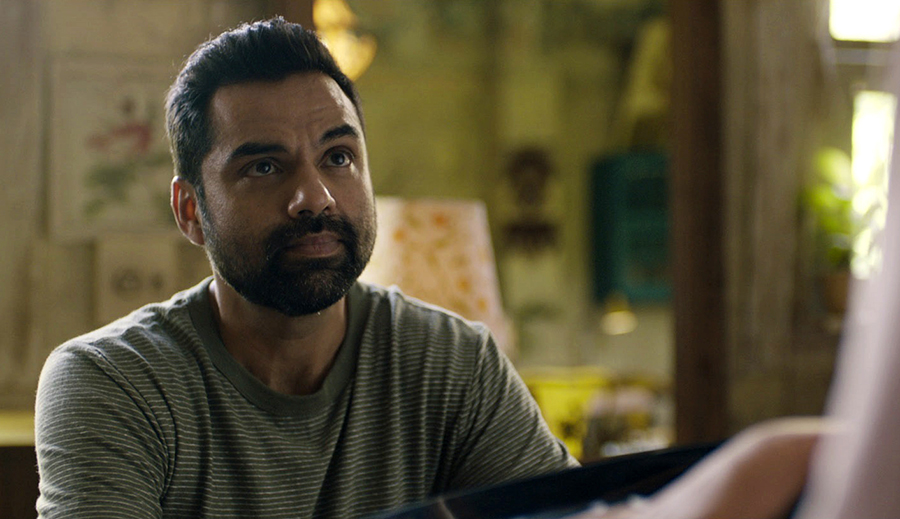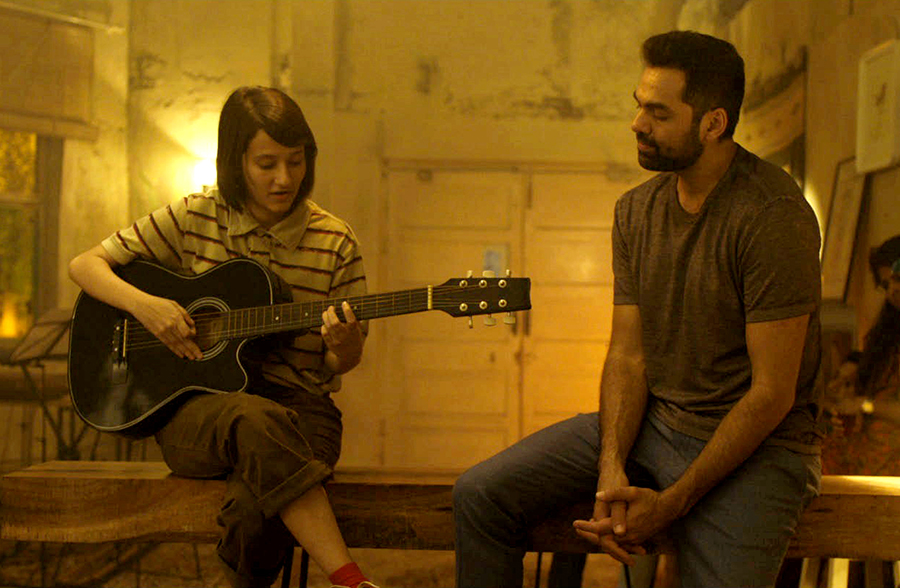At the Indian Film Festival of Los Angeles, Abhay Deol unveiled his latest project, director Megha Ramaswamy's ‘The Odds’. He spoke to OGS about being a producer, the challenging slate of acting projects ahead, and why he strives to break away from Bollywood.
‘The Odds’ is a web-series set in a whimsical version of Mumbai, and follows a day in the life of a high-spirited teenager, Vivek (Yashaswini Dayama), who commits a small, clunky crime in school as a mark of ‘protest’. This leads to an unexpected friendship with the well-behaved, head-boy, Ashwin (Karanvir Malhotra). The mundane becomes magical, as events unfurl from the duo's past, present and future in the accidental fairytale they are meant to tell.
Abhay Deol, the series’ co-producer, also stars in a supporting role as an indie musician and Vivek’s mentor. This FilmKaravan Original, produced by Pooja Kohli, Apoorva Bakshi and Sanjay Bachani is currently under production and will release later this year. A 90-minute extract premiered at the Indian Film Festival of Los Angeles's Closing Gala on April 14th.

Having chosen strong, independent films centred on content rather than box office, how did ‘The Odds’ fit into your diverse palette, as actor and producer?
In ‘The Odds’, the director is making a statement through the things she is not explicitly saying. Reading an early draft of the script, I could see that she was a non-conformist, arrogantly bold, unapologetic, contemporary, intelligent, uncompromising, and ready to fight the world to keep her vision and her voice intact — against ‘the odds’, if I may put it so!
When turning to produce films, did you see it as a risk or an asset?
Necessity, I would say, to begin with. But now, I’ve begun to enjoy the process, particularly because the digital space is expanding, and the stranglehold of the few families that have controlled Bollywood for the last few decades, is loosening. It is both a risk and an asset. Risk because you are completely responsible for yourself and are most vulnerable, and ironically it's an asset, for the same reasons. You are more involved and invested in it, and the vulnerability can push you forward or backwards. This is something one should be aware of from the start.
When picking a script/story to back, how much does its arthouse or mainstream nature matter?
I started off with an agenda to only do arthouse. But, over the years I began to appreciate the value of a well-made commercial project. Don’t get me wrong, my ‘arthouse’ was in context to Bollywood, a genre that is very limiting in its setup to any filmmaker. All it took was to take out the songs and the dances to be considered arthouse. So, at the heart of it, I have always been very commercial in my outlook to films, ‘Dev.D’ is the only story that I have developed and it defines my vision even today — a blend of the traditional with a contemporary twist. I look for relatability in a character and a story while picking a project.
With burgeoning digital content and VOD platforms as an alternative to theatrical distribution, is the current film scene less frustrating?
Yes, it has definitely opened up the playing field to a lot more diverse filmmakers and personalities. It has also created a certain amount of respect for creators that they did not get in an environment where a small group of people at the top led to a sycophantic, conformist, herd mentality, which was very regressive. Today, the definition of a filmmaker as an artist has a lot more credibility than ever before.
Do you prefer to work with fresh, young talent, like the director Megha and the two leads, Yashaswini and Karanvir: if so, why?
I don’t have a preference of one over the other as they both come with pros and cons. New talent is a lot more idealistic and adventurous, but old talent comes with experience and knowledge. What is exciting to see is the world view of the current new crop of actors/directors today. With the internet came exposure to the world and our people were spoilt for choice. That awareness has led to an artist’s desire to raise the bar, to be non-conformist, to explore creativity outside of the boxes they are raised in and exposed to. That can be said about all three of them.
This time, you play an indie singer-musician, and you sang in ‘Zindagi Na Milegi Dobaara’. Is singing a hidden talent or just a hobby?
With auto-tune, almost anybody can become a singer today! I am not a singer but have sung songs where I could hit the note. I wouldn’t be surprised if the composers used auto-tune for me. I never set out to become a singer. The music of this movie is inspired by the late 70’s/early 80’s punk rock and [Jamaican] ska era. Raghav Meattle has sung the songs and Sagar Desai is the composer. It is very different from what you would hear in an Indian film. But then, I think that is the charm of this story. Nothing within it conforms to any expectations.

Yashaswini Dayama and Abhay Deol in 'The Odds'
With ‘The Odds’ addressing dysfunctional family dynamics of young adults, what is your view on Indian parents ceding some control and letting children come into their own?
I think it is important to have a balanced upbringing. I am not one to spare the rod and spoil the child, but then again I wouldn’t beat my beliefs into anyone. Children need guidance, not control. And if you guide them, you will automatically help them develop their own individuality.
What stands out in the show is the whimsical, personified glory of Mumbai. Tell us about your relationship with the city over the years.
I was born here and so have seen it change tremendously over the decades. It is the most cosmopolitan city in the country. People from all over come here to pursue their dreams. It is sad that because of corruption, the infrastructure of the city is collapsing. It has become unbearable to live in as the quality of life goes down, but the spirit of the people has never soared higher. I live out of a bag, so I have spent less and less time in the city over the past decade. But it is always nice to come back to it to see family and friends. If you’re a fan of Bollywood and want to break into it, then it is the place to be. I am not.
Picking up from your school days, have you ever considered acting in theatre again?
The film industry is so demanding that I don’t get the time! I’m also a producer so that adds to my commitments to the industry. I wish I could though, although the theatre scene in the country needs a lot more investment.
In your next film, ‘Line of Descent’ directed by Rohit Batra, a gangster-thriller, you play a cop. How was your experience with the genre and the diverse cast and crew?
That was a very challenging role to play, which was also why I enjoyed it so much. I enjoy all genres, it’s essential for me to jump from one to the other. It makes my experience more eclectic and expansive. Working with other talented and experienced actors like Ronit Roy and Neeraj Kabi helped me build upon my own creativity. They set the bar very high. As an artist, nothing can be more nurturing.
Your upcoming Tamil debut, again as actor-producer, ‘Idhu Vedhalam Sollum Kathai’ (IVSK), will see you speaking ancient Tamil. What made you take on this challenge? Do you value regional languages entering mainstream cinema?
The script is what attracted me most to it. I can’t say much about it yet but it is a very special project and will take a lot of people by surprise. Now that the digital space is growing in India, it is only a matter of time before you will see regional cinema enter the mainstream dialogue. The reason India has the biggest film industry in the world is that almost every state has its own industry in its own dialect/language. Because Bollywood dominates so much of the market space, it is considered the biggest industry in the world. But it is only a part of a bigger picture. It is time we started giving due credit to other languages within the country.
What other projects of yours should we look forward to?
I have ‘Chopsticks’, which is the first Netflix Original shot and produced in India. There is ‘Jungle Cry’, a true story based on a team of tribal/OBC kids in Orissa who went on to learn rugby and win the under 14 world rugby championship in England back in 2007. There is the sci-fi thriller ‘JL-50’ along with ‘IVSK' and ‘The Odds’. Coincidentally none of my projects are Bollywood films: one is a Canadian production, one is British, two of them are American, and one in Tamil. I have two more films lined up to shoot for this year, again a Canadian and an American production. Globalization has given me a new lease on life. If I was left to Bollywood alone, I would have been a masseur on a beach somewhere by now.
This article first appeared in the On Global Screens magazine. Subscribe now!